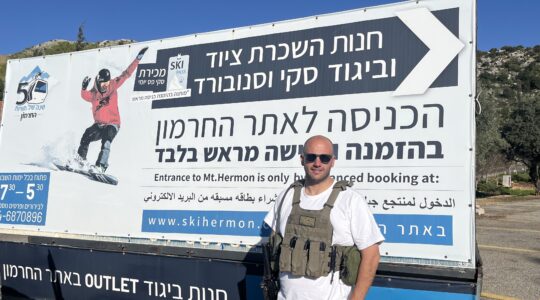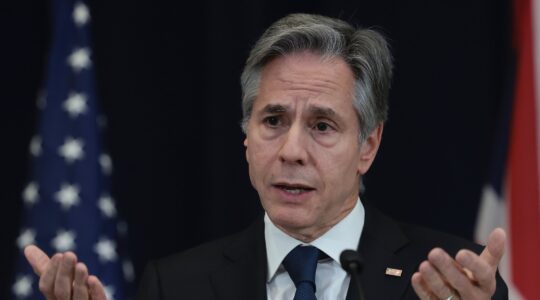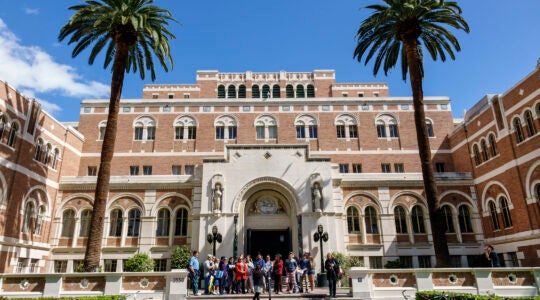NEW YORK (JTA) — Hardly a week goes by that the Israeli Knesset doesn’t receive a delegation of visiting American Jewish VIPs. They come from Jewish organizations, federations and communities, sometimes with U.S. politicians, business leaders or big donors in tow.
There’s much less traffic in the other direction.
When Knesset members do come to the United States, it’s usually for meetings in Washington or to deliver a speech at some event or another. Often they do a lot of talking without having to do much listening.
But a visit last week to Boston and New York by six Israeli Knesset members from the Likud, Kadima and Labor parties was all about listening — part of a new effort by an American Jewish foundation to strengthen the U.S.-Israel relationship by educating Israeli political leaders about the American Jewish community.
One by one, the Knesset members present on the trip’s final day described being startled at one point or another by what they encountered over the course of their week in the United States.
“I came knowing very little about American Jewry,” said Carmel Shama of Likud. “In the short run, Israel and American Jewry can exist and get along without each other, but not in the long run.”
Labor’s Daniel Ben Simon was shocked by the grace and tolerance of a rabbi in Boston who helped him find some non-kosher ice cream even though Ben Simon had just eaten kosher meat.
“He helped us sin with grace and with a smile,” Ben Simon said.
Kadima’s Ronit Tirosh was surprised to learn that the protesters who disrupted one of the trip’s events — a speech at Brandeis University by participant Avi Dichter, a Knesset member from Kadima and former Shin Bet chief — were Jews and Israelis.
“I thought, American Jews, they are born as Jews, so they favor Israel,” Tirosh remarked.
Shama said that after listening to American Jews, he now has a completely different view of the debate surrounding the controversial Rotem bill — proposed Knesset legislation that has upset an array of American Jewish groups for the way it would change how Israel handles converts from abroad and conversions at home.
“Now I look at the Rotem issue in a wider and deeper way,” Shama said.
That, said Jay Ruderman, whose family foundation sponsored the inaugural trip for Knesset members in conjunction with Brandeis’ Hornstein Jewish Professional Leadership Program, was precisely the point.
“Israel is the center of the Jewish world, and the Knesset makes decisions that affect the whole Jewish world,” said Ruderman, who immigrated to Israel from the Boston area five years ago.
After making aliyah, Ruderman said, he discovered that Israelis didn’t know about the world from which he came. The new Ruderman Fellows program, which he plans to replicate with other Knesset members, aims to change that.
Not that it will be easy. For one thing, having Knesset members take a week off from their busy schedules to participate in a weeklong program in America is no easy feat.
At one point during a breakfast presentation last Friday morning at the offices of the Anti-Defamation League, three of the Knesset members were studying their cellphones, one had wandered out of the room and one already was gone, having flown back to Israel. The sixth was listening.
During their week here, the Knesset members met with religious leaders from the major Jewish denominations, talked with college students, toured Boston, saw a Broadway show, attended a $200-a-plate dinner of the American Israel Public Affairs Committee, visited the Boston Jewish federation, had lunch at the Harvard Club and stopped by a Jewish day school. They also took in lectures about American Jewish history, the Boycott, Divestment and Sanctions movement, and anti-Semitism in America.
Throughout the week they were accompanied by Ruderman and Jonathan Sarna, who teaches American Jewish history at Brandeis and helped design the itinerary.
Sarna said that during a sabbatical in Israel last year, he was struck by Israeli ignorance of American Jewry.
“Even the leading figures in Israel do not feel they understand American Jewry appropriately,” he said.
Some of the Knesset members who participated are regular visitors to the United States. Dichter says he comes about twice a year. Ben Simon was here only a few weeks ago, when he spoke at the J Street conference in Washington.
But others, like Labor’s Eitan Cabel, who has been in the Knesset since 1996, had never been to America.
“Even here there are Jews with the same problems we face in Israel,” Cabel said, sharing some of what he said he learned on the weeklong trip. “We can’t forget that after Israel, this is the biggest Jewish community.”
Perhaps more than anything else, the Knesset members said the trip showed them that Israel has much to learn from the liberalism, pluralism, diversity and tolerance that exists in the American Jewish community. Shama noted that it would be nice to have haredi Orthodox Knesset members go on such a trip.
While many Israeli politicians bristle at the notion of American Jews tinkering in Israeli politics — last month the Knesset held hearings investigating J Street, which seeks to pressure Israel into reaching a settlement with the Palestinians — Ben Simon said American Jews need to play a bigger role in Israeli political and social debates.
“You should take a position because it will affect American Jews here,” Ben Simon said. “You’re not courageous enough to tell Israeli leaders what you’re doing has an impact on us.”
In his halting English, Cabel said, “We must AIPAC and we must J Street.”
Since the Labor Party split several weeks ago, both Cabel and Ben Simon are in the Knesset opposition. Ben Simon criticized the current government, calling it “not friendly to American Jews” and citing the investigation of J Street as one example.
“We have to be more in contact with American Jewry,” Tirosh said.
To that end, Tirosh said she’d like to create a caucus in the Knesset focused on North American Jewry.





